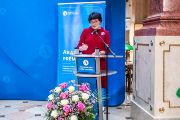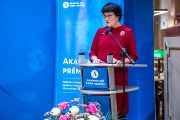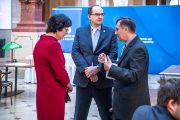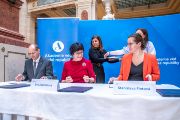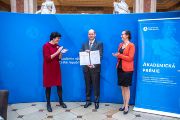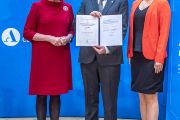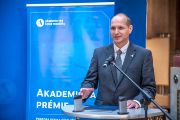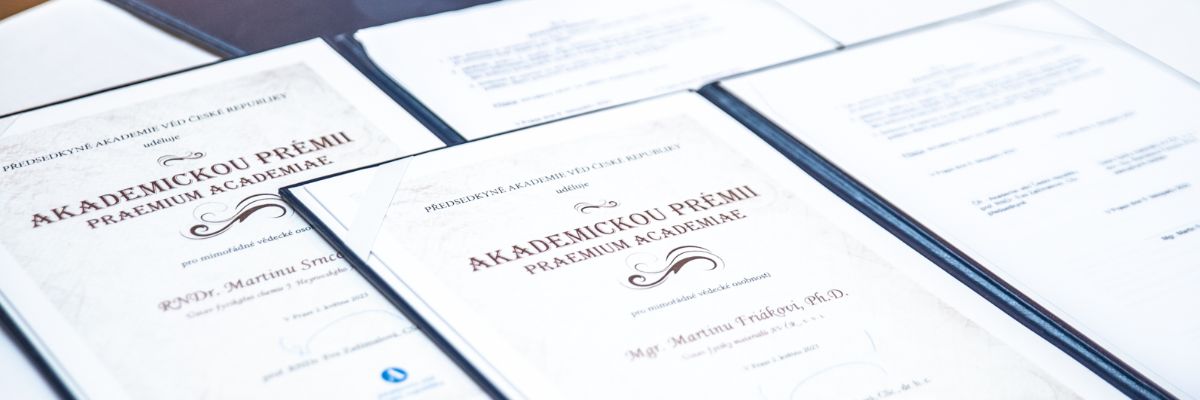
Three CAS researchers received the Academic Award – Praemium Academiae
10. 11. 2023
On 9 November 2023, three internationally renowned researchers from the Czech Academy of Sciences received the Academic Award – Praemium Academiae from the President of the CAS, Eva Zažímalová. The financial reward of up to CZK 30 million will help them advance research which holds current social relevance. The awards in 2023 were bestowed to social geographer Petr Jehlička, theoretical chemist Martin Srnec, and physicist Martin Friák.
The award ceremony was held as part of the annual popular science festival, the Week of the Czech Academy of Sciences. As Eva Zažímalová, the President of the Czech Academy of Sciences (CAS), noted, “Awarding the Praemium Academiae during this festival makes sense. A relevant part of scientific work is also public outreach and popularisation – and the results of the newest recipients of the Academic Award are definitely worth checking out.” According to her, the research results of the new laureates fulfil the motto of the CAS Strategy AV21, “top research in the public interest”.
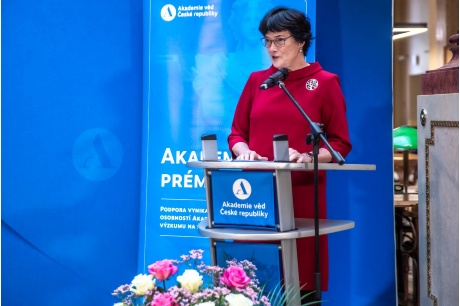
Eva Zažímalová, President of the CAS, presented the Academic Award at the Library of the CAS.
Materials and artificial intelligence
Research in the field of materials involves computing using the most accurate calculations based on quantum mechanics. “Quantum computers are a promising computing technology. We expect that it will make it possible to speed up calculations by up to one million times, allowing us to work with what has until now been out of our reach,” explains Martin Friák from the Institute of Physics of Materials of the CAS.
The scientist, who found his passion for physics already as a child, is the principal investigator of a joint project of his home institute and MIT. The Academic Award will allow Friák to develop his new project “The Science of Hybrid Computational Materials: Quantum Computers and Artificial Intelligence”, which focus on the use of so-called “hybrid” algorithms that link classical computers with quantum computers, in addition to AI and machine learning methods. According to Friák, quantum computers may soon become tools that benefit the whole of society.
Recognition from a Nobel Prize laureate
Most of Martin Srnec’s research at the J. Heyrovský Institute of Physical Chemistry of the CAS takes place behind a computer – that’s because he is a computational chemist. With funding from the Academic Prize, he plans to develop a tool for understanding and theoretically predicting selectively controlled chemical reactions with proton and electron transfer. These are typical of living organisms and of energy conversion and storage.
“Twenty-two years ago, I used to spend my days here in the Library of the CAS as a student. Back then, I would never have imagined I’d one day receive this award here,” Martin Srnec recalled. He also added that what he enjoys most about computational chemistry today is the feeling of having his predictions verified by means of experiments.
Among other things, Martin Srnec is the author of a concept that has generated a considerable response from the scientific community, including the 1992 Nobel Prize in Chemistry laureate, Rudolph A. Marcus. “At that time, the number of exceptions to the rule was growing in my field. It occurred to me to combine the quantities I was working with in such a way that it enabled the clarification of a number of hitherto unexplained principles,” notes the researcher who was influenced in his choice of career when he met physical chemist and former President of the CAS, Rudolf Zahradník.
Strategies of consumption
The RESOURCE project by Petr Jehlička from the Institute of Ethnology of the CAS focuses on the strategies of water and food consumption of Czech households. In the project, the researcher, who started out as a natural scientist, addresses issues such as how to ensure sufficient food and water in Europe. However, he focuses on entrenched household practices that have so far stood outside the attention of researchers. “We want to draw attention to sustainable but ‘invisible’ practices that need to be preserved and developed – for instance, subsistence farming,” Jehlička outlines.
The project will also follow households in the Netherlands, where food is managed less economically than in the Czech Republic. “The view in Western Europe is that Central Europe has no knowledge of sustainability. Yet our ecological footprint, for instance, is 20 percent lower than in Western countries,” Jehlička says, pointing out that in the social sciences, these countries tend to view the rest of Europe as “on the periphery”.
Jehlička and the international team he will assemble thanks to the award will bring a new impetus to academic debates concerning households and approaches to sustainability. Their research findings may later serve as a “roadmap” for other EU countries.
Praemium Academiae as financial and moral support
The Academic Award is used as a tool for offering funding and moral support to excellent CAS researchers in order to develop their potential. The amount of the premium (up to CZK 30 million) can be used by the recipients over the following six years to pay for technical equipment, salaries, and research costs. The Praemium Academiae has been awarded by the CAS since 2007, the list of laureates can be found on the CAS website.
Prepared by: Zuzana Dupalová, External Relations Division, CAO of the CAS, drawing on the press release issued by the CAS
Translated by: Tereza Novická, External Relations Division, CAO of the CAS
Photo: Josef Landergott, External Relations Division, CAO of the CAS
 The text and photos are released for use under the Creative Commons license.
The text and photos are released for use under the Creative Commons license.
Read also
- A trapped state: The pandemic impact on public attitudes, trust, and behavior
- Aerial archaeology: Tracing the footsteps of our ancestors from the sky
- Archaeologists uncover ancient finds along Prague Ring Road
- Our microbiome largely depends on what we eat, says microbiologist Michal Kraus
- The ABCs of writing: Why did its invention mark a turning point for humankind?
- We learn, remember, forget… What can memory actually do? And can we outsmart it?
- New Center for Electron Microscopy in Brno opens its doors to global science
- The hidden lives of waste: What can we learn from waste workers and pickers?
- A unique lab is hidden right beneath Prague’s Vítkov Hill
- Renewables are a strategic investment in European security, scientists say
The Czech Academy of Sciences (the CAS)
The mission of the CAS
The primary mission of the CAS is to conduct research in a broad spectrum of natural, technical and social sciences as well as humanities. This research aims to advance progress of scientific knowledge at the international level, considering, however, the specific needs of the Czech society and the national culture.
President of the CAS
Prof. Eva Zažímalová has started her second term of office in May 2021. She is a respected scientist, and a Professor of Plant Anatomy and Physiology.
She is also a part of GCSA of the EU.




